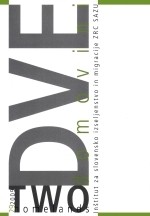“Could I Ask You, my Brother, to Send me a Little Something?” Remitting Behaviour Among Arabs and Bosniaks in Slovenia
Keywords:
remittances, social networks, migration, Arabs, BosniaksAbstract
The paper addresses motivations for patterns and types of remittances, which can be defined as a set of gifts in different forms. Generally speaking, remittances refer to a variety of transfers between migrants and individuals or groups remaining in countries of origin. The latter most often include both core and extended families. In addition to transfers, the paper deals with processes of incorporation and preservation of migrants’ sense of belonging to the place of origin, and with processes of linking them with places of residence. Furthermore, the authors discuss the essence of social responsibility evident in migrants’ incorporation, maintenance of their sense of belonging, their image, social authority, substance, respect and inclusion into their sending societies. The focus is on migrants’ motivation, as well as on factors existing in countries involved in transnational connections stimulating and hindering processes of remitting. The authors discuss social and demographic distribution and the importance of social pressures faced by migrants and expectations of other members of the social networks which play an essential part in the aforementioned processes.
Downloads
References
Al-Ali, Nadje, Richard Blake and Khalid Koser (2001). The limits to “transnationalism“: Bosnian and Eritrean refugees in Europe as emerging transnational communities. Ethnic and Racial Studies, 24 (4), 578–600.
Brettell, Caroline B. and James F. Hollifield (2008). Migration theory. Talking across disciplines. New York and Oxon: Routledge.
Briant, Sophie (2005). The remittance sending behavior of Liberians in Providence. Thesis (M.A.): Brown University.
Caces, Fe, Fred Arnold, James T. Fawcett and Robert W. Gardner (1985). Shadow households and competing auspices. Migration Behavior in the Philippines. Journal of Development Economics, 17 (1–2), 5–25.
Cliggett, Lisa (2003). Gift remitting and Alliance Building in Zambian Modernity: Old Answers to Modern Problems. American Anthropologist, 105 (3), 543–552.
Cohen, Jeffrey H. and Leila Rodriguez (2004). Remittance Outcomes in Rural Oaxaca, Mexico: Challenges, Options, and Opportunities for Migrant Households. Center for Comparative Immigration Studies. Working Papers 102. http://repositories.cdlib.org/ ccis/papers/wrkg102
Čapo Žmegač, Jasna (2003). Transnacionalizam, lokalitet, rod: hrvatske migrantske obitelji u Münchenu. Traditiones, 32 (2), 179–192.
Embassy of the Republic of Slovenia, Sarajevo, Bosnia and Herzegovina http://sarajevo. veleposlanistvo.si/index.php?id=1901, last accessed 20. 7. 2008
Gurak, Douglas and Fe Caces (1992). Migration Networks and the Shaping of Migration Systems. International Migration Systems. A Global Approach (eds. Mary Kritz, Lin Lean Lim and Hania Zlotnik). Oxford: Clarendon Press, 150–176.
Haas de, Hein (2006). Migration, remittances and regional development in Southern Morocco. Geoforum, 37, 565–580.
Haas de, Hein (2007). Remittances, Migration and Social Development: A Conceptual Review of the Literature. UNRISD: Social Policy and Development Programme Paper Number 34.
Kalčić Špela (2007). “Nisem jaz Barbika” Oblačilne prakse, islam in identitetni procesi med Bošnjaki v Sloveniji. Ljubljana: Filozofska fakulteta Univerze v Ljubljani. Oddelek za etnologijo in kulturno antropologijo (Županičeva zbirka).
Lamberger Khatib, Maja (2009). Social networks among Arabs in Slovenia. Razprave in gradivo, 58 (to be published in June 2009).
Levitt, Peggy (1998). Social Remittances: Migration Driven Local-Level Forms of Cultural Diffusion. The International Migration Review, 32 (4), 926–948.
Lianos, Theodore P. (1997). Factors determining migrant remittances: The case of Greece. The International Migration Review, 31 (1), 72–87.
Maggard, Kasey Q. (2004). The Role of Social Capital in the Remittance Decisions of Mexican Migrants from 1969 to 2000. Working paper 2004–29. Working paper Series: Federal reserve bank of Atlanta.
Mauss, Marcel (1996). Esej o daru in drugi spisi. Ljubljana: ŠKUC, Znanstveni inštitut Filozofske fakultete (Studia Humanitatis).
Menjívar, Cecilia, Julie DaVanzo, Lisa Greenwell in R.Burciaga Valdez (1998). Remittance Behavior Among Salvadoran and Filipino Immigrants in Los Angeles. The International Migration Review, 32 (1), 97–126.
Mežnarić, Silva (1989). “Bosanci” a kuda idu Slovenci nedeljom? Ljubljana: Krt knjižnica revolucionarne teorije.
Olwig, Karen Fog (2003). “Transnational” socio-cultural system and ethnographic research: Views from an extended field site. The International Migration Review, 37 (3), 787–811.
Petrović, Vladimir (2006). Jugoslavija stupa na bliski iztok. Stvaranje jugoslovenske bliskoistočne politike 1946–1956. Beograd: Institut za suvremeno istoriju.
Pezdir, Tatjana (2007). Stiki in vezi z izvornim okoljem. Ko ste v družbi svojih ljudi, gre za popolnoma drugačen občutek. Priseljenci: študije o priseljevanju in vključevanju v slovensko družbo (ed. Miran Komac). Ljubljana: Inštitut za narodnostna vprašanja, 423–445.
Portes, Alejandro (1995). Economic Sociology and the Sociology of Immigration: A Conceptual Overview. The Economic Sociology of Immigration: Essays on Networks, Ethnicity, and Entrepreneurship (ed. Alejandro Portes). New York: Russell Sage Foundation, 1–41.
Schrover, Marlou and Floris Vermeulen (2005). Immigrant Organisations. Journal of Ethnic and Migration Studies, 31 (5), 823–832.
The Statistical Office of the Republic of Slovenia, Census 2002. http://www.stat.si/popis2002/si/rezultati/rezultati_red.asp?ter=SLO&st=53, last accessed 20.1.2008
Vertovec, Steven (1999). Conceiving and researching transnationalism. Ethnic and Racial Studies, 22 (2), 447–63.
World bank http://siteresources.worldbank.org/INTPROSPECTS/Resources/334934-1199807908806/, last accessed 24. 7. 2008
Downloads
Published
How to Cite
Issue
Section
License

This work is licensed under a Creative Commons Attribution-NonCommercial-NoDerivatives 4.0 International License.
Authors guarantee that the work is their own original creation and does not infringe any statutory or common-law copyright or any proprietary right of any third party. In case of claims by third parties, authors commit their self to defend the interests of the publisher, and shall cover any potential costs.
More in: Submission chapter





